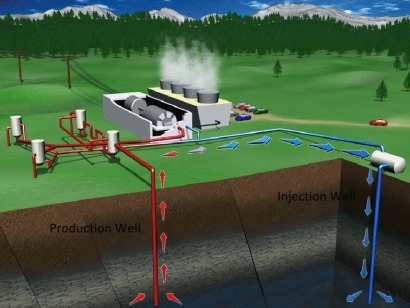
Saskatchewan. Natural Resources Canada will contribute approximately $1.0 million through its ecoEII program and SaskPower, subject to the successful completion of a funding agreement with DEEP, is considering a contribution up to $1.2 million to the FEED study's review of technical data, reservoir tests, and development of detailed costs for the next phases of the project.
“Through the ecoENERGY Innovation Initiative, our Government is investing in innovative clean energy technologies that create jobs, generate new economic opportunities and protect the environment,” said Joe Oliver, Canada’s Minister of Natural Resources. “This program demonstrates our tangible support for energy projects that drive energy innovation.”
Upon successful conclusion of the study, it is DEEP’s intention to pursue a 5 MW binary geothermal power plant that would be located near Estevan, Saskatchewan, that would generate power from a hot aquifer located 3 kilometres under the surface.
Five megawatts is roughly the power required by 5,000 homes, and DEEP’s proposed plant would offset 40,000 metric tonnes of CO2 per year, equivalent to the emissions from 8,016 cars.
The firm's principles hope that if the FEED study proves successful, this would create the opportunity to develop multiple geothermal plants over the next decade.
“This first project could launch a brand new sustainable power supply industry for Canada. The United States is the number one geothermal power producer in the world, and geothermal opportunities do not end at the border,” said Kirsten Marcia, DEEP's President and CEO.
Binary geothermal power plants utilizing the Organic Rankine Cycle have become the preferred means of exploiting hot sedimentary aquifers; more than 800 MW of these plants are in operation today.
DEEP’s project will closely resemble these existing power plants, company officials said.
For additional information:

